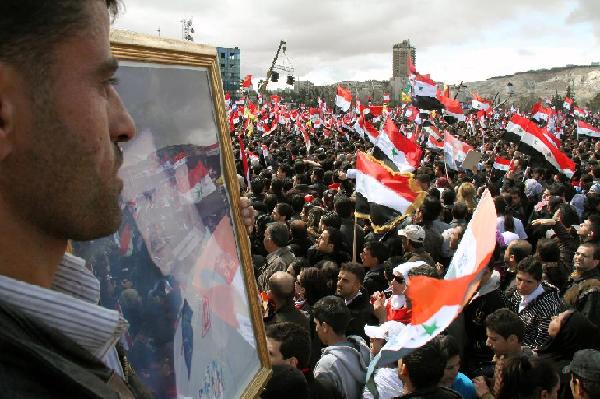Syrian gov't survives year-long crisis
 0 Comment(s)
0 Comment(s) Print
Print E-mail Xinhua, March 16, 2012
E-mail Xinhua, March 16, 2012
A year has passed since Syria saw the eruption of domestic unrest inspired by the regional unrests that have toppled some Arab regimes. President Bashar al- Assad apparently still stands strong after a year of mounting pressure, which is manifested by the millions of peoples filling the country's major squares on Thursday in a show of support to the leader.
 |
|
Government supporters attend a rally on Umayyad Square in Damascus, Syria, March 15, 2012. Tens of thousands of pro-government Syrians dashed through streets and main squares nationwide to stage rallies in support of embattled President Bashar al-Assad on March 15, 2012. [Xinhua] |
One year of pressure, isolation, unrelenting sanctions
Over a year, Syria has been subject to intolerable pressure from Arab and western countries. A squeezing isolation has been imposed on the country coupled with unrelenting sanctions that targeted all vital sectors in the country.
The West and the Arab League (AL) have worked to shake Syria economically to break up the close connection between the commercial sector and the government, undermine its Arab legitimacy by halting Syria's AL membership, and ensure all-out support for broad-based opposition.
The sanctions and isolation have to some extent worsened the people's hardship as prices of most commodities have skyrocketed, businesses halted, and the Syrian pound sharply deceased in value. However, the government, likely after receiving funds from its close ally Iran, has readjusted and succeeded in the past few days in maintaining the currency value.
The exchange rate for U.S. dollar reached 100 pounds last week, but it declined to 79 pounds a couple of days ago. All in all, the pound has lost over 50 percent in value against the dollar in the past few months.
Syria blames unrest on armed groups backed by foreign plot
Syria claims that it is subject to a conspiracy backed by Arab powers and European countries because of its close ties with Iran and other resisting groups in the region.
It argues that those countries have channeled money and weapons to the Syrian opposition, claiming that those armed groups killed thousands of army troops, security agents and policemen over the past year and lately carried out massacres to frame the Syrian army and call for foreign interference.
After failures to bring to the opposition to talks and reforms to ease concerns, the government resorted to a military solution, challenging international outcry and threats.
The three-week crackdown on Baba Amr neighborhood in Homs, which is regarded as an opposition stronghold, led the government to a political and military advantage in the area.
The government said it killed and arrested tens of terrorists and restored calm to this restive area. The crackdown spread to the north in search of more rebel forces.
Fractured opposition fails to unite against Assad
In August, opposition figures in exile tried to group their forces under the Syrian National Council (SNC) to form a united force against the government. However, this council was marred with wrangling and differences among its members.
Two prominent opposition leaders said on Wednesday that they have quit the SNC. More are likely to abandon the council which some of the members described as "autocratic."
The resignations dealt a heavy blow to the opposition, which has somewhat reinforced the government's stature in the Arab and international arena due to their failure to unite ranks.
In such climate of variables, attention has been shifted to the option of political solution to the crisis.
Luai Hussain, the head of the opposition group "Building Syria State," said that it's about time to achieve a political settlement that is satisfactory to all parties.
Hussain told Xinhua that intellectual elites should take a leading role in steering the country into democracy.
A recent visit to Syria by UN-Arab League envoy Kofi Annan unveiled that President Assad is determined to eradicate insurgents as well to commence dialogue.
Annan did not even allude to the possibility of a regime change and his mission was confined to convincing the Syrian leader of halting violence and launching negotiations with the opposition.
Assad's rejection to dialogue outside Syria reveals that what Damascus was ready to do few months ago is no longer on the table, especially amid an apparent Arab and international abandonment of the idea of toppling the government by force.






Go to Forum >>0 Comment(s)